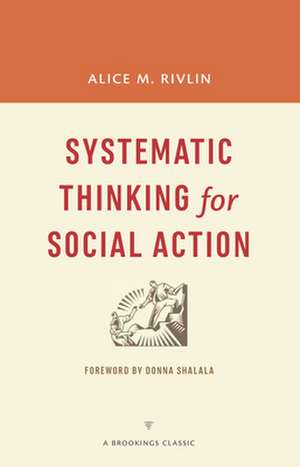Systematic Thinking for Social Action: A Brookings Classic
Autor Alice M. Rivlin Cuvânt înainte de Donna Shalalaen Limba Engleză Paperback – 24 mar 2015
In January 1970 Alice M. Rivlin spoke to an audience at the University of California-Berkeley. The topic was developing a more rational approach to decisionmaking in government. If digital video, YouTube, and TED Talks had been inventions of the 1960s, Rivlin's talk would have been a viral hit. As it was, the resulting book, Systematic Thinking for Social Action, spent years on the Brookings Press bestseller list. Is is a very personal and conversational volume about the dawn of new ways of thinking about government.
As deputy assistant secretary for program coordination, and later as assistant secretary for planning and evaluation, at the Department of Health, Education and Welfare from 1966 to 1969, Rivlin was an early advocate of systems analysis, which had been introduced by Robert McNamara at the Department of Defense as PPBS (planning-programming-budgeting-system).
While Rivlin brushes aside the jargon, she digs into the substance of systematic analysis and a 'quiet revolution in government. In an evaluation of the evaluators, she issues mixed grades, pointing out where analysts had been helpful in finding solutions and where—because of inadequate data or methods—they had been no help at all.
Systematic Thinking for Social Action offers important insights for anyone interested in working to find the smartest ways to allocate scarce funds to promote the maximum well-being of all citizens.
As deputy assistant secretary for program coordination, and later as assistant secretary for planning and evaluation, at the Department of Health, Education and Welfare from 1966 to 1969, Rivlin was an early advocate of systems analysis, which had been introduced by Robert McNamara at the Department of Defense as PPBS (planning-programming-budgeting-system).
While Rivlin brushes aside the jargon, she digs into the substance of systematic analysis and a 'quiet revolution in government. In an evaluation of the evaluators, she issues mixed grades, pointing out where analysts had been helpful in finding solutions and where—because of inadequate data or methods—they had been no help at all.
Systematic Thinking for Social Action offers important insights for anyone interested in working to find the smartest ways to allocate scarce funds to promote the maximum well-being of all citizens.
| Toate formatele și edițiile | Preț | Express |
|---|---|---|
| Paperback (2) | 179.34 lei 6-8 săpt. | |
| Brookings Institution Press – 24 mar 2015 | 179.34 lei 6-8 săpt. | |
| Brookings Institution Press – iul 1971 | 188.09 lei 6-8 săpt. |
Preț: 179.34 lei
Nou
Puncte Express: 269
Preț estimativ în valută:
34.32€ • 35.92$ • 28.56£
34.32€ • 35.92$ • 28.56£
Carte tipărită la comandă
Livrare economică 31 martie-14 aprilie
Preluare comenzi: 021 569.72.76
Specificații
ISBN-13: 9780815726449
ISBN-10: 0815726449
Pagini: 142
Dimensiuni: 140 x 216 x 10 mm
Greutate: 0.23 kg
Ediția:With a New Pref
Editura: Brookings Institution Press
Colecția Brookings Institution Press
Seria A Brookings Classic
ISBN-10: 0815726449
Pagini: 142
Dimensiuni: 140 x 216 x 10 mm
Greutate: 0.23 kg
Ediția:With a New Pref
Editura: Brookings Institution Press
Colecția Brookings Institution Press
Seria A Brookings Classic
Notă biografică
Alice M. Rivlin is a senior fellow in Economic Studies at Brooking, a visiting professor at the Public Policy Institute of Georgetown University, and the director of the Engelberg Center for Health Care Reform. She has served on the President's Debt Commission, was founding director of the Congressional Budget Office, director of the Office of Management and Budget, and a Federal Reserve vice chair. She is an expert on fiscal and monetary policy.
Descriere
In January 1970 Alice M. Rivlin spoke to an audience at the University of California-Berkeley. The topic was developing a more rational approach to decisionmaking in government. If digital video, YouTube, and TED Talks had been inventions of the 1960s, Rivlin's talk would have been a viral hit. As it was, the resulting book, Systematic Thinking for Social Action, spent years on the Brookings Press bestseller list. Is is a very personal and conversational volume about the dawn of new ways of thinking about government.
As deputy assistant secretary for program coordination, and later as assistant secretary for planning and evaluation, at the Department of Health, Education and Welfare from 1966 to 1969, Rivlin was an early advocate of systems analysis, which had been introduced by Robert McNamara at the Department of Defense as PPBS (planning-programming-budgeting-system).
While Rivlin brushes aside the jargon, she digs into the substance of systematic analysis and a 'quiet revolution in government. In an evaluation of the evaluators, she issues mixed grades, pointing out where analysts had been helpful in finding solutions and where—because of inadequate data or methods—they had been no help at all.
Systematic Thinking for Social Action offers important insights for anyone interested in working to find the smartest ways to allocate scarce funds to promote the maximum well-being of all citizens.
As deputy assistant secretary for program coordination, and later as assistant secretary for planning and evaluation, at the Department of Health, Education and Welfare from 1966 to 1969, Rivlin was an early advocate of systems analysis, which had been introduced by Robert McNamara at the Department of Defense as PPBS (planning-programming-budgeting-system).
While Rivlin brushes aside the jargon, she digs into the substance of systematic analysis and a 'quiet revolution in government. In an evaluation of the evaluators, she issues mixed grades, pointing out where analysts had been helpful in finding solutions and where—because of inadequate data or methods—they had been no help at all.
Systematic Thinking for Social Action offers important insights for anyone interested in working to find the smartest ways to allocate scarce funds to promote the maximum well-being of all citizens.


















